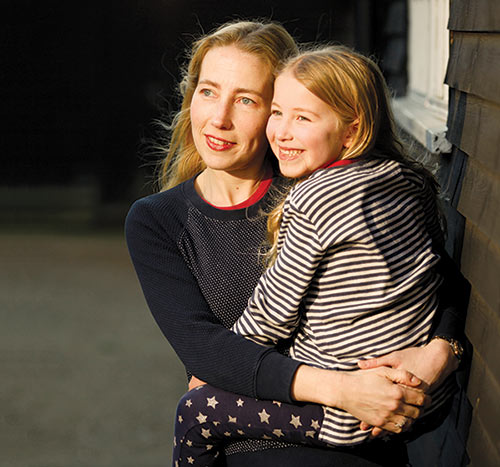 Speaking freely to anyone is something we might think is simple and take for granted. But for some children and adults speaking to people outside of their circle of close family and friends does not come easily. Here Anna Hinde speaks to one little girl and her family from Ham in east Kent…
Speaking freely to anyone is something we might think is simple and take for granted. But for some children and adults speaking to people outside of their circle of close family and friends does not come easily. Here Anna Hinde speaks to one little girl and her family from Ham in east Kent…
When four-year-old Poppy told her mum she ‘just wanted to be normal’ as they drove home together after a birthday party, mum Kate Griffin-Bent knew it was time to help her overly shy daughter and get to the bottom of her problem.
It was this realisation that ‘something wasn’t right’ for both Poppy and Kate that started the family on what was to be a three year journey of discovery and a diagnosis of selective mutism (SM).
Kate admits she’d always had concerns about Poppy, now seven, as she didn’t integrate well at playschool and didn’t play with other children.
“She’d always been shy. Even as a baby she wouldn’t happily go to other people but when she was three it started to become a real problem,” said Kate.
“She wouldn’t look at people, she would turn her head away. And she couldn’t stand to touch grass or sand – things that other toddlers love.”
Despite this Poppy had reached her development milestones but Kate just knew something wasn’t right.
The family suspected autism but it didn’t make sense. “There were two versions of my daughter: The quiet one who couldn’t seem to understand simple things being asked of her – she would freeze and couldn’t move when asked by the health visitor to wave her hand,” says Kate. “And there was the bright and bubbly Poppy who loved reading, running about and shouting at home.”
The family’s break-through came when Kate attended a reluctant speakers course run by Maggie Johnson, a Kent Community Health NHS Trust speech and language therapist advisor, and one of the UK ’s leading experts on SM .
The course is aimed at parents, educators and health professionals to give them an understanding of what causes children to withdraw from communication in certain situations and the knowledge to develop a strategy for managing this.
Kate said: “Attending the course was an eye-opener for me. I could see there were two very extreme versions of Poppy and that we needed to get her to a stage where she was confident to speak freely.”
Poppy still had sensory issues which had never been diagnosed but thanks to help from KCHT ’s speech and language team, the family sought more professional advice and were soon to discover that Poppy was also suffering from sensory processing disorder (SPD). It was the final piece of the puzzle and explained why Poppy was highly sensitive to things like loud noises, smells and texture.
Kate said: “Maggie and her team know their stuff. I trusted Maggie and she was right about Poppy. Finally everything made sense. I could finally see the light at the end of the tunnel.”
Poppy had started at a private school by this point, but unfortunately, despite the best efforts of Kate, Maggie and Poppy’s speech and language therapist, Marie Hackshall, the school were not always consistent in dealing with Poppy’s SM .
Last year the family made the brave decision to take Poppy out of that school and send her to the local primary near their home in Ham. And the decision was the right one as the school team have acknowledged Poppy’s difficulties and made communication a pleasurable, rather than fearful, experience.
Kate’s experiences led her to start a Facebook group – East Kent Selective Mutism Support Group. Through this Poppy has realised she is not alone and that there are other children out there with similar issues.
Kate said: “It’s Poppy’s personal challenge to beat this. She is still scared to talk to new people but she’s determined to make the changes herself. I know we are now on the right path.”
Maggie, who is the co-author of The Selective Mutism Resource Manual, said: “It’s hard to understand this condition. It is natural to feel offended or annoyed when children seem to be ignoring you but insisting that they talk is the wrong thing to do.
“Children with SM who cannot communicate suffer from feelings of anxiety, frustration and inadequacy. Quite often it is the adults who need to change their behaviour in order to take the pressure off the child which in turn reduces their anxiety about speaking.”
Marie Hackshall, Poppy’s speech and language therapist, and KCHT ’s Head of Universal Speech and Language Therapy Service, said: “We are in the process of rolling out a training programme to teachers and parents across Kent with the aim of providing them with the knowledge to help children with selective mutism get the support they need.”
Kate said: “We couldn’t have done it without Maggie and Marie’s help. They are always at the other end of the phone, and have been very supportive in helping me educate Poppy’s school, and the other parents and children there. Very few people understand selective mutism. Poppy knew she needed to change and with the right support she can.”